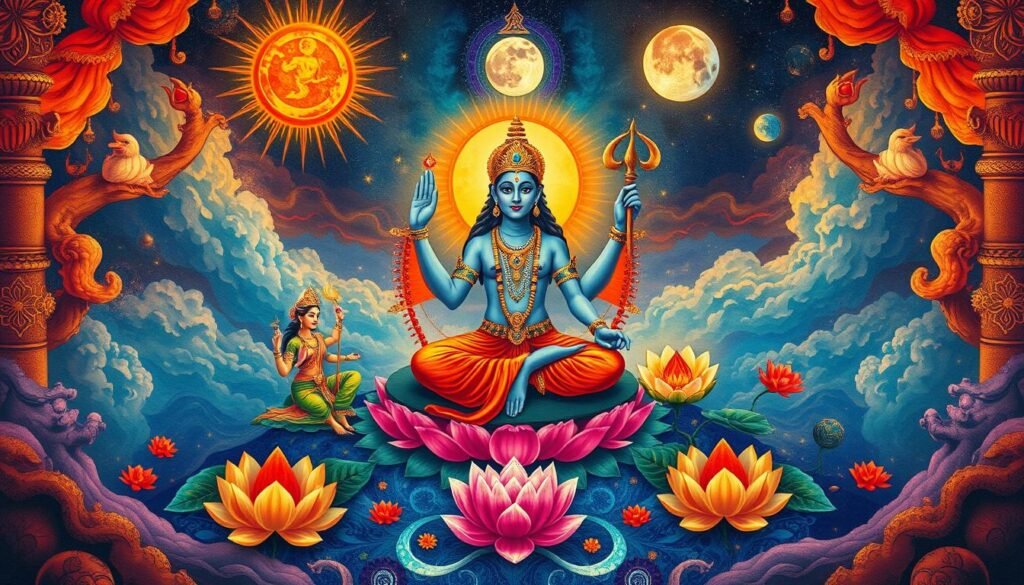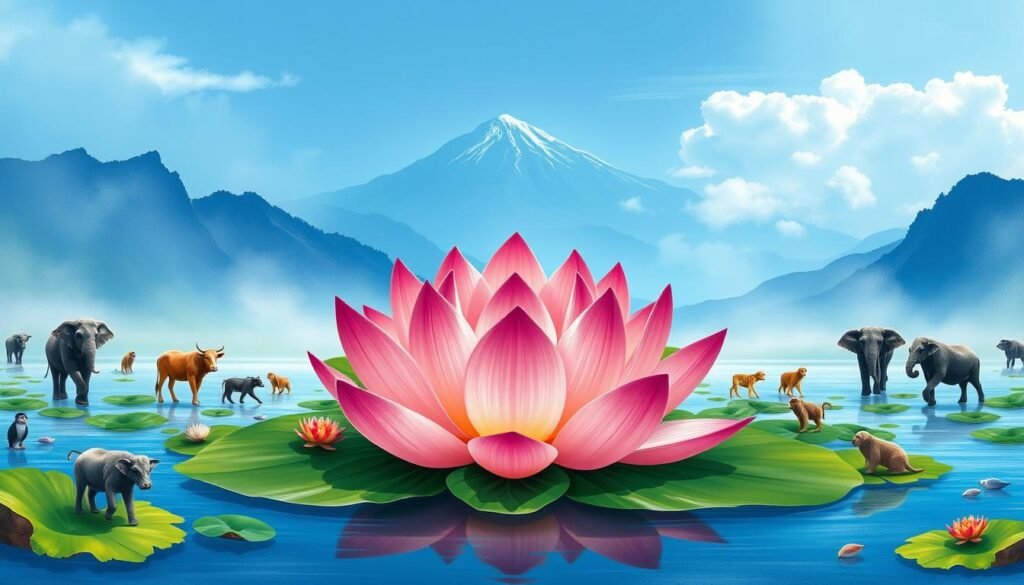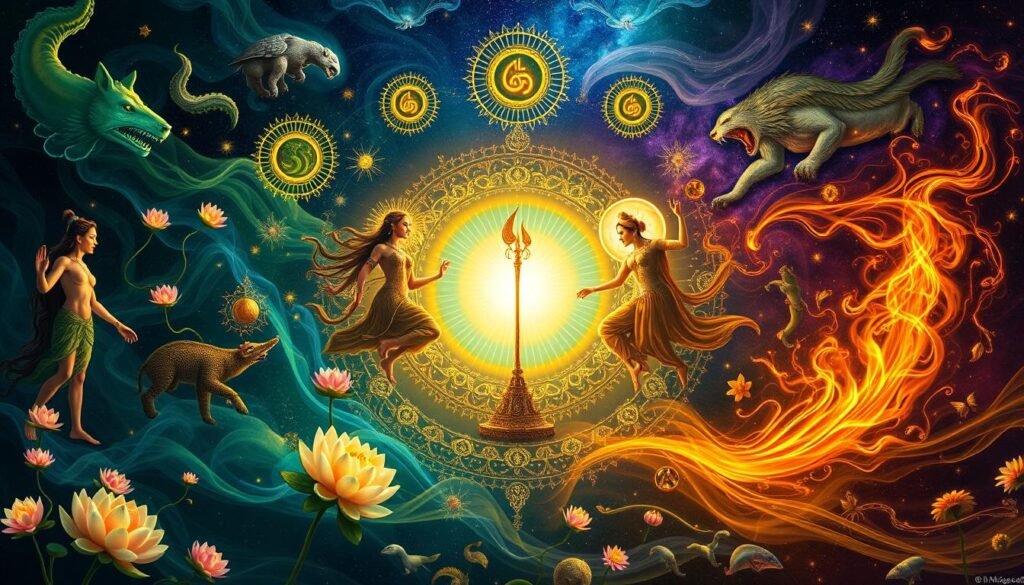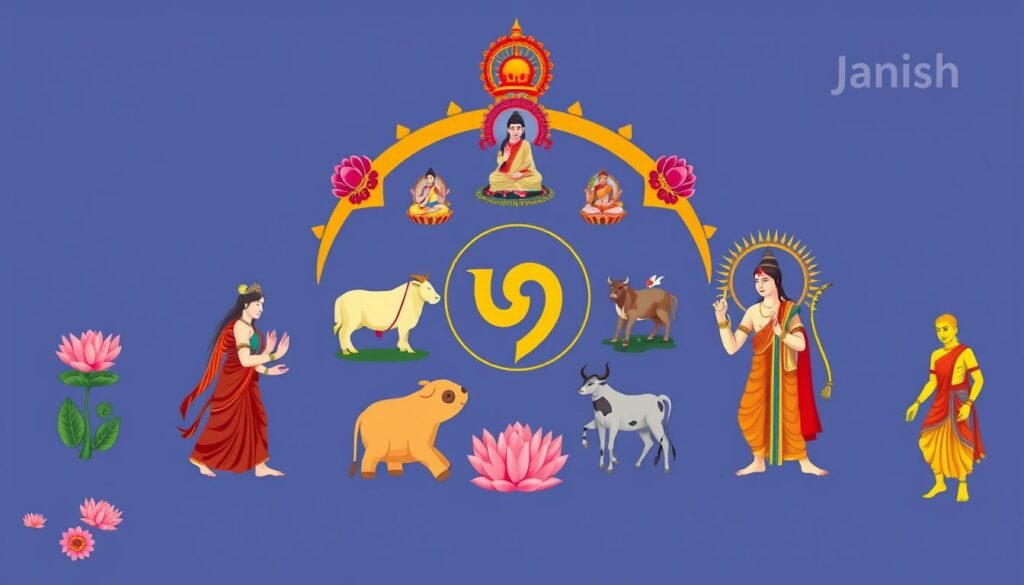Hindu Mythology Reincarnation : Hinduism is one of the oldest and most influential religions in the world. It deeply believes in reincarnation. This idea, called “samsara,” shows how the soul, or “atman,” moves through birth, death, and rebirth. Hindu myths and texts have always talked about this cycle. They give deep insights into the self, karma, and the goal of spiritual freedom.
Key Takeaways : Hindu Mythology Reincarnation
- Hinduism believes in the concept of reincarnation, where the soul or “atman” is reborn into a new physical form after death.
- The cycle of birth, death, and rebirth, known as “samsara,” is driven by an individual’s karma, or the accumulation of their actions and deeds.
- Hindu mythology and scriptures, such as the Vedas and the Bhagavad Gita, provide detailed explanations of the reincarnation process and the ultimate goal of achieving “moksha,” or liberation from the cycle of birth and death.
- Reincarnation beliefs are deeply woven into the fabric of Hindu philosophy, influencing the way Hindus approach life, death, and the pursuit of spiritual enlightenment.
- Understanding the Hindu perspective on reincarnation can offer valuable insights into the religion’s unique worldview and its enduring influence on human spiritual exploration.
Introduction to Hindu Reincarnation Beliefs

Reincarnation is a key idea in Hinduism. It says the soul (atman) lives on in a new body after death. This belief is part of the samsara, a cycle of birth, death, and rebirth.
The Concept of Atman and Samsara
The atman is seen as a piece of the divine Brahman, the highest reality in Hinduism. It moves through lives based on karma, the rule of cause and effect. This means our actions affect our future lives.
Significance of Reincarnation in Hindu Philosophy
Hindu thought sees reincarnation as very important. It helps us understand life’s purpose, the soul’s nature, and the goal of moksha. Moksha means escaping the cycle of rebirth.
“Through many births have I wandered, seeking the builder of this house (the body). Painful is birth again and again. O house-builder, thou hast been seen; thou shalt build no house again. All thy rafters are broken, thy ridge-pole is shattered; my mind has attained the Unconditioned, achieved the destruction of all desires.” – The Buddha, in the Dhammapada
Hindu beliefs about reincarnation come from its deep mythology and ancient texts. They give a special view on life, death, and changing spiritually.
Karma: The Driving Force Behind Reincarnation
In Hindu beliefs, karma is key to the cycle of life and death. It means that what we do now affects our future lives. Our actions, thoughts, and feelings shape our next rebirth.
Every action has a reaction, and this is carried over to the next life. This idea teaches the value of living ethically and being responsible for our choices. By fixing past mistakes and avoiding new ones, we aim to end the cycle of birth and death. This leads to moksha, or spiritual freedom.
The Law of Action and Reaction
The Hindu texts say that every action has a reaction. This is the core of the karmic system. Thoughts, feelings, and deeds influence our lives now or later. This makes us think carefully about our actions, aiming for a virtuous life.
Resolving Karmas Through Ethical Living
Living ethically helps fix past karmas and stop the cycle of rebirth. It means being kind, honest, and non-violent. By doing good and spiritual practices, we clean our minds and souls. This leads to moksha and freedom from the cycle of life and death.
“The soul is neither born, nor does it ever die; nor, having once existed, does it cease to be. The soul is unborn, eternal, permanent, and primeval.” – Bhagavad Gita
Hindu Mythology Reincarnation
The idea of reincarnation is a big part of Hindu mythology and ancient writings. The Vedas, Upanishads, and Bhagavad Gita talk a lot about the soul’s journey through many lives. They explain how rebirth happens, the different places we can exist (like heavens, hells, and earth), and the goal of moksha or freedom from the cycle of samsara.
Ancient Texts and Scriptures on Reincarnation
Hindu myths and stories show characters remembering their past lives or changing forms. This supports the idea that the soul keeps going and that life, death, and rebirth are part of a cycle. The hindu philosophy of reincarnation and how hinduism explains rebirth are key ideas in these old texts. They give us a peek into reincarnation in hindu culture and hindu spiritual views on reincarnation.
“The soul transmigrates into new bodies, leaving behind the old and useless as a man casts off his worn-out clothes.” – The Bhagavad Gita
These writings tell us about the soul’s endless journey. It moves from one body to another, influenced by karma and the search for spiritual knowledge. By learning about Hindu teachings on reincarnation, we can understand more about the hindu philosophy of reincarnation and its deep impact on hindu spiritual views on reincarnation.
The Cycle of Birth, Death, and Rebirth
At the heart of Hindu perspectives on reincarnation is the idea of samsara. This is the endless cycle of birth, death, and rebirth. Hindus think that the atman, or the soul, moves into a new body after death. The kind of life it gets into next depends on its karma. This cycle lets the soul grow and move towards spiritual enlightenment by facing the results of its past actions.
The idea of reincarnation according to Hindu mythology is key to Hindu thought. It’s based on the belief that the atman, the true self, lives forever after the body dies. It then takes on a new body, based on the karma from past lives.
Understanding Hindu rebirth beliefs helps grasp the Hindu view on reincarnation. This cycle of birth, death, and rebirth helps the soul grow and reach moksha, or freedom from the cycle of samsara. The main aim of a Hindu’s life is to escape this cycle and find spiritual enlightenment.
| Key Aspects of the Cycle of Reincarnation in Hinduism | Description |
|---|---|
| Samsara | The endless cycle of birth, death, and rebirth |
| Atman | The individual soul that is reborn into new physical bodies |
| Karma | The actions and decisions that shape the nature of one’s next life |
| Moksha | The ultimate goal of liberation from the cycle of reincarnation |
Moksha: Liberation from the Cycle of Reincarnation
In Hindu philosophy, moksha is the top goal for a devotee’s spiritual path. It means freedom from the cycle of birth, death, and rebirth called samsara. This deep enlightenment comes from understanding the true self, the atman, and connecting it with the supreme Brahman.
Attaining Spiritual Enlightenment
To reach moksha, one must let go of worldly desires and clear past karmic debts. Spiritual practices like meditation and living ethically, as taught in the Vedas and Upanishads, help purify the mind and atma. This leads to knowing one’s true nature and ending the cycle of birth and death.
The Ultimate Goal of a Hindu’s Life
In Hindu yogic philosophy, getting to moksha is the top goal. It means being free from samsara and the need for rebirth. By knowing they are part of the Brahman, people go beyond the physical world. They find the joy of spiritual liberation.
“Moksha is the highest goal of a Hindu’s life, where the individual merges with the divine and transcends the cycle of birth and death.”
Reincarnation Beliefs in Various Hindu Traditions
The idea of reincarnation is key in many Hindu traditions. It talks about the cycle of life, death, and rebirth. Different groups have their own views, but they all focus on karma, samsara, and moksha. These are important for understanding spiritual growth and the journey of the atma (the soul).
Vedic Tradition: Karma, Samsara, and Moksha
In the Vedic tradition, the vedas and upanishads talk about life’s cycle. The atma is reborn over and over, based on karma (actions and their effects). The main goal is to reach moksha, or freedom from rebirth, by understanding its true nature as part of the brahman.
Buddhist and Jain Perspectives
Buddhism and Jainism started in Hinduism and also believe in reincarnation, but with their own twists. Buddhists talk about anatta (no-self), while Jains focus on the jiva (soul) and its rebirth cycle. Both traditions see the impermanence of the body and the chance for spiritual enlightenment and freedom.
These Hindu traditions see reincarnation as a way to live ethically, grow personally, and seek spiritual freedom from rebirth.
“The soul is not born, nor does it ever cease to be. It is without birth, eternal, everlasting, and ancient. It is not slain when the body is slain.” – The Bhagavad Gita
Also Read : How do well-known myths impact stories, films, and everyday life?
Conclusion
The idea of reincarnation is a big part of Hindu mythology and philosophy. It helps us understand life, its purpose, and how we can grow spiritually. At the heart of Hindu teachings is the belief in the eternal soul and its journey through life and death.
This journey is shaped by karma, the idea that our actions have consequences. Our past actions decide where we are reborn. This cycle helps us grow spiritually.
The Vedas and Upanishads, ancient Hindu texts, tell stories that deepen our understanding of reincarnation. They teach us about living ethically and seeking enlightenment. The goal is to reach moksha, or freedom from the cycle of rebirth.
Across different Hindu traditions, the belief in reincarnation and spiritual growth unites people. It shows us the value of life and our connection to everything. This belief helps us find meaning and a deeper connection to the divine.
FAQs
Q:What is the Hindu belief in reincarnation?
Hinduism believes in reincarnation, where the soul lives on after death and is reborn. This idea comes from ancient texts that talk about the cycle of life and death. They call this cycle samsara.
Q:What is the concept of atman and samsara in Hinduism?
Atman is the eternal soul in Hinduism. It is reborn into new bodies based on past actions and deeds. This cycle continues until the soul finds freedom through spiritual enlightenment.
Q:How does the principle of karma drive the cycle of reincarnation?
Karma, or the law of action and reaction, drives reincarnation. Every action has a consequence that follows to the next life. By clearing past karmas, Hindus aim to end the cycle and gain spiritual freedom.
Q:What are the ancient Hindu texts and scriptures that discuss reincarnation?
Hindu mythology and ancient scriptures like the Vedas and Upanishads talk about reincarnation. They explain the soul’s journey, rebirth, and the goal of spiritual freedom.
Q:What is the cycle of birth, death, and rebirth (samsara) in Hinduism?
Samsara is the cycle of birth, death, and rebirth at the heart of Hindu beliefs. The soul is reborn based on past actions. This cycle ends when the soul gains spiritual freedom.
Q:What is the ultimate goal of a Hindu’s life according to the belief in reincarnation?
The ultimate goal is to achieve moksha, or spiritual freedom. This is done through enlightenment and realizing the divine. By clearing past debts and breaking the cycle, the soul merges with the divine.
Q:How is the belief in reincarnation shared across different Hindu traditions?
Different Hindu traditions share the belief in reincarnation, but with varying details. The Vedic tradition focuses on karma, samsara, and moksha. Buddhism and Jainism, rooted in Hinduism, also believe in reincarnation but with different emphases.
Source Links
- https://www.hinduismtoday.com/hindu-basics/karma-and-reincarnation/
- https://www.bbc.co.uk/bitesize/guides/zmgny4j/revision/3
- https://en.wikipedia.org/wiki/Reincarnation









